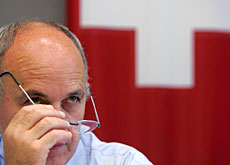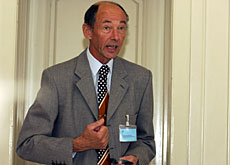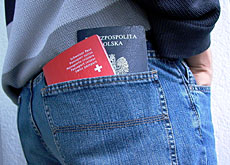Torn between passports

Up to one million Swiss could be forced to relinquish a passport if the rightwing Swiss People’s Party succeeds in its threat to abolish dual nationality.
Several other countries have also revised their rules, but experience shows that the process can be fraught with difficulties.
Triumphant after voters threw out proposals to ease citizenship restrictions last month, the People’s Party has now set its sights on abolishing the right to dual citizenship.
The law was revised in 1992, since when Swiss citizens have been allowed to hold more than one passport. Reversing the legislation would affect about a million Swiss citizens, taking into account the approximately 434,000 dual citizens living abroad.
“It would certainly be a major step backwards if this were to happen,” Jean-Paul Aeschlimann, vice-president of the Organisation of the Swiss Abroad (OSA) told swissinfo.
Blood or birth?
In most countries, citizenship has historically been based on one of two principles: the right of territory (“jus soli”) or the right of blood (“jus sanguinis”).
Countries like the United States and France adhere to the former, granting citizenship almost automatically to anyone born in the country. They usually also permit citizens to hold more than one passport.
This explains why nearly one in three French people has parents or grandparents of overseas origin.
The United States prefers a “don’t ask, don’t tell” approach, treating all citizens as Americans, and ignoring the fact that a citizen may be in possession of another passport. Indeed, US legislation contains no provisions governing dual nationality.
Blood
Germany and Italy, by contrast, have historically granted citizenship only to people who can prove they are “German” or “Italian” by blood.
In the case of Germany, restrictions on citizenship have been eased recently, but young immigrants who do qualify are permitted to hold two passports only until they are 23 years old. They must then choose one or the other.
Italy amended its legislation to allow dual nationality in 1992. It also now allows children born in the country to apply for citizenship at age 18. Normally, this is granted, provided the applicant has lived in Italy since birth, and that the application is filed within a year after one’s 18th birthday. Any delay means the “right” to citizenship is lost.
Ambiguous
The rules in many other countries are ambiguous. Austria, for instance, does not allow citizens to hold a passport of another country, but may make an exception if one applies for permission. To qualify for Austrian citizenship, one normally has to have lived in the country for ten years.
The Netherlands, for its part, is in the process of tightening its laws. Once an immigrant can demonstrate sufficient proficiency in Dutch, and show that he or she is familiar with the country and its people, a passport is normally not far away.
But new legislation currently working its way on to the statute books will remove the right to dual nationality unless immigrants can prove that giving up citizenship of their native country would cause significant problems.
Fraught
Switzerland’s Federal Office of Immigration, Integration and Emigration (IMES), says tightening the rules regarding dual nationality is fraught with problems.
Attempts in neighbouring Italy to outlaw dual citizenship failed because the rules proved impossible to enforce.
And even if countries successfully compel citizens to choose one nationality, there is nothing to prevent them from re-gaining the one they gave up at a later date, Daniel Babey of IMES told swissinfo.
He added that outlawing it in Switzerland would be extremely costly, given the administrative burden of checking whether one million citizens had actually complied.
swissinfo
An estimated 500,000 people living in Switzerland are dual nationals.
Around 434,000 Swiss living abroad also hold at least two passports.
Laws outlawing dual nationality in other countries have proved difficult to enforce.

In compliance with the JTI standards
More: SWI swissinfo.ch certified by the Journalism Trust Initiative


You can find an overview of ongoing debates with our journalists here . Please join us!
If you want to start a conversation about a topic raised in this article or want to report factual errors, email us at english@swissinfo.ch.